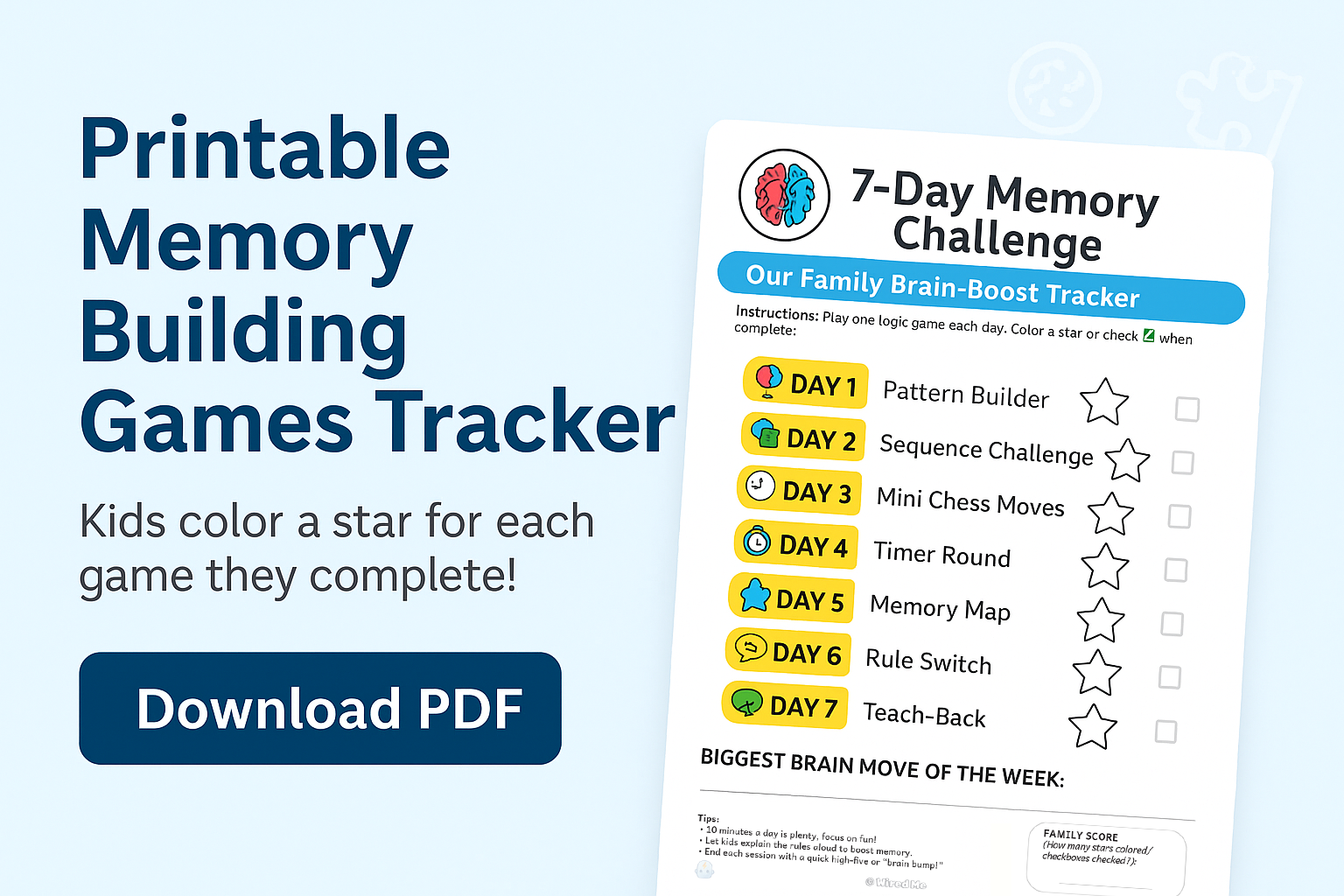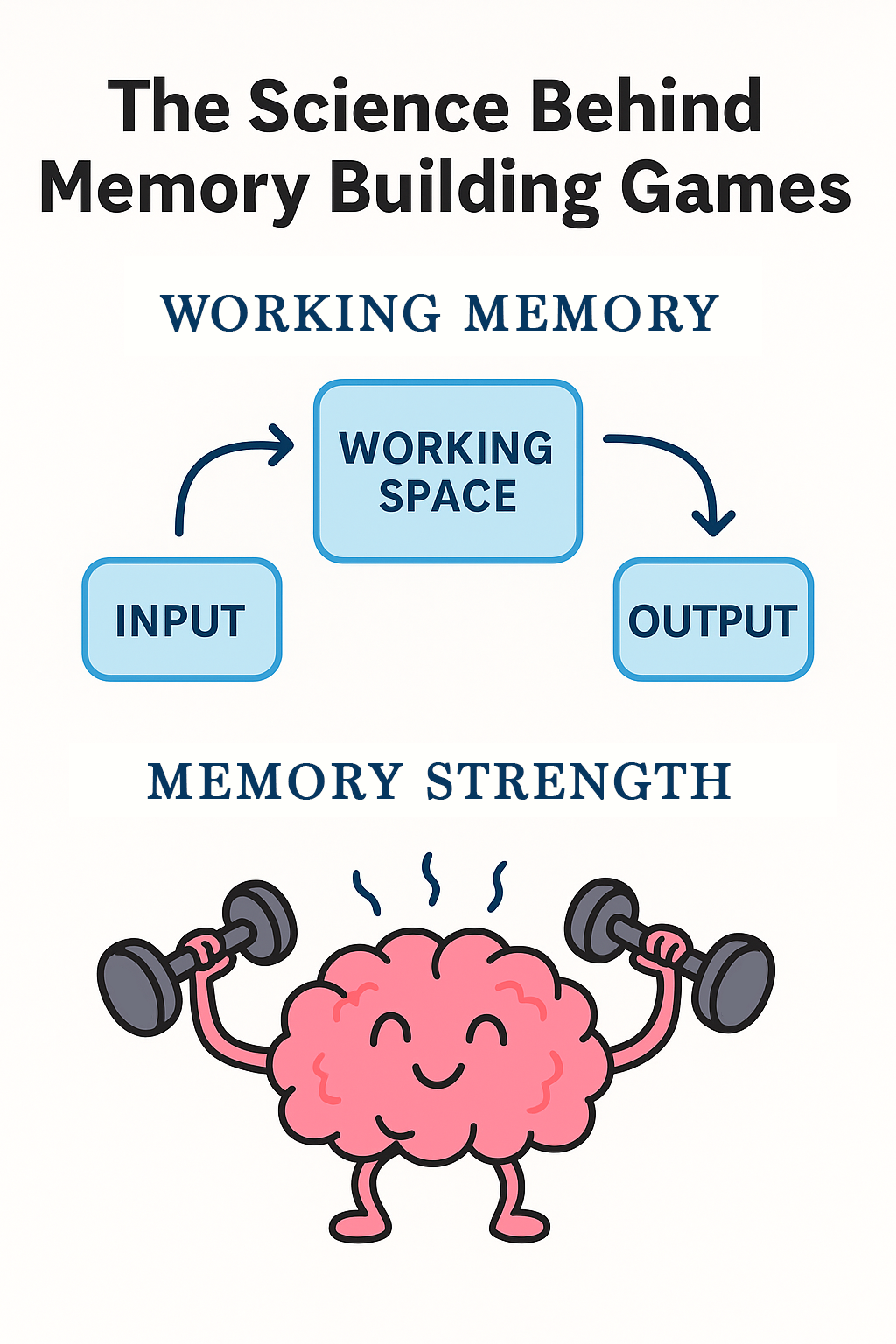The Secret Power of Memory Building Games
What if just ten minutes of memory building games could make your child more focused, organized, and confident in school? It sounds simple, yet the science behind it is surprisingly powerful. In fact, short bursts of daily play can lead to big improvements in attention and recall over time.
Many parents want to help their kids improve focus and memory, but few want to add more worksheets or screen time. Fortunately, the solution might already be sitting on your game shelf. Daily logic play is more than fun; it is a simple form of brain training that strengthens attention, planning, and memory through play rather than pressure. As a result, kids build stronger thinking habits without even realizing they are learning.
When kids play memory building games, they learn to hold information in mind, stick with a plan, and think ahead. Over time, these games improve the same mental skills children rely on for schoolwork, chores, and problem solving. If your child struggles to remember multi-step directions or stay on task, daily play can help strengthen those skills naturally. Plus, it creates positive family moments that make learning feel enjoyable.
In this post, you will discover how memory building games work, why repetition is key, and how to start a simple 7-Day Challenge your family can enjoy together. By the end, you will have easy ways to make brain training part of everyday play.
The Science Behind Memory Building Games
To understand why these games are so effective, consider how working memory functions. Working memory acts as the brain’s mental notepad, allowing your child to hold on to information just long enough to use it. For example, they might remember a rule while taking a turn or recall a step in a recipe while mixing ingredients. This mental flexibility helps them adapt and learn more efficiently.
Every time your child plays memory building games, that mental notepad gets a workout. Each turn involves remembering previous moves, predicting what might happen next, and adjusting the plan accordingly. Therefore, these games naturally build stronger recall, sharper focus, and better problem solving. Simply put, the more they play, the more efficiently their brain stores and retrieves information. Over time, those small efforts add up to meaningful progress.
Research highlight
According to Harvard’s Center on the Developing Child, executive function, which includes focus, memory, and planning, develops through repeated and structured practice. Memory building games provide exactly that kind of consistent, playful exercise. In addition, the low-pressure environment keeps children motivated to continue learning.
Studies show that children who regularly play structured games improve attention, recall, and persistence. As a result, families who make these games part of their daily routine often notice smoother homework sessions, calmer study times, and better overall focus.
How Memory Building Games Train the Brain
Memory building games may look like simple fun, but they strengthen three essential brain skills: attention, planning, and memory. Each game session gives these mental muscles a small workout, which eventually leads to noticeable growth. In other words, fun today builds focus for tomorrow.
Attention: Focus on patterns and rules
Games like Connect 4 and Simon Says train kids to notice important details and ignore distractions. This kind of focus also helps during reading, listening, and classwork. Over time, regular play increases their ability to concentrate and stay engaged longer. Therefore, consistent practice through play can make classroom learning feel easier and less frustrating.
Planning: Think ahead and adapt
Strategy games such as Chess, Rush Hour, and Checkers encourage kids to anticipate the next move and adjust if things change. These games teach patience and problem solving. As a result, children begin to think ahead naturally, which helps them organize homework, plan projects, and even manage daily routines more effectively.
Memory: Hold steps, sequences, and strategies
Classic card games like Memory Match or Sequence challenge kids to remember positions and patterns. Each round reinforces working memory and recall. In addition, as they play, children start grouping information or noticing patterns, which makes learning new material easier later on. For instance, they might recognize letter patterns in reading or number sequences in math with greater ease.
Why Daily Play Works Best
Short, consistent practice works better than long, occasional sessions. Scientists call this the “spaced practice effect.” When children practice for just ten minutes a day, the brain strengthens its connections between sessions. As a result, what they learn sticks longer and becomes easier to recall later.
It is far better to play a few rounds of memory building games each day than one long session on the weekend. Daily practice is easier to fit in and more beneficial for the brain. Try attaching playtime to a regular part of your day, such as after lunch, before dinner, or right before bedtime. That way, it becomes a natural, predictable part of your routine rather than another task to remember.
Printable Memory Building Games Tracker

Download the free 7-Day Memory Building Games Scorecard. Each time your child plays for ten minutes, they color a star on their tracker. This simple visual reminder helps them see progress and stay motivated throughout the week. In addition, it turns daily play into a fun, goal-driven habit.
The 7-Day Memory Building Games Challenge
Ready to give it a try? The 7-Day Memory Building Games Challenge takes only ten minutes per day and uses games you probably already have at home. Each day focuses on one skill, attention, planning, or memory, so kids stay engaged while building brain power. Even better, the challenge keeps practice fun and consistent.
| Day | Game | Focus Skill |
|---|---|---|
| Day 1 | Connect 4 or visual patterns | Sequencing and short-term recall |
| Day 2 | Simon Says or I Am Going On a Trip | Auditory memory |
| Day 3 | Chess or Checkers | Planning ahead |
| Day 4 | Rush Hour | Focus under light pressure |
| Day 5 | Memory Match | Visual working memory |
| Day 6 | Uno | Cognitive flexibility |
| Day 7 | Teach-Back | Retrieval and long-term memory |
After each session, let your child color a star and share one thing they remembered or improved. This small reflection reinforces what they have learned while giving you a window into their progress. You can also share your family’s challenge on social media using #MemoryInPlay to inspire others. As a result, learning becomes a community effort that feels encouraging and rewarding.
Expert Insights and Real-World Wins

According to cognitive development researcher Dr. Adele Diamond, activities that combine fun, challenge, and repetition are among the most effective ways to strengthen memory and mental flexibility. Her research shows that playful learning experiences, practiced consistently, build the same executive function skills that support focus, self-control, and problem solving (Science, 2011).
Clear, small, consistent steps really do create lasting change. Therefore, setting aside ten minutes a day can have an impact far beyond the game board. Small wins equal big results.
Beyond the Game Board: Everyday Benefits
The skills kids build through memory games reach far beyond game night. They become better at following directions, planning tasks, and sticking with challenging projects. For example, cooking, building with blocks, or planning a family trip all involve the same sequencing and logic they use during play.
When parents point out these connections, kids begin to view challenges as puzzles to solve rather than obstacles to avoid. That shift in mindset builds resilience, confidence, and curiosity. In the long run, these skills will support them in school, relationships, and everyday problem solving.
Play Today, Remember Tomorrow
Memory building games offer an easy, screen-free way to strengthen focus, recall, and planning. Just ten minutes of playful, intentional practice each day can help your child build lasting cognitive skills that make learning smoother and life easier. Most importantly, it keeps family learning fun and consistent.
So tonight, skip the screens and grab a favorite game or puzzle. Start your family’s 7-Day Memory Building Games Challenge and enjoy the simple joy of learning together. You will be building memories in more ways than one. Finally, remember that small steps repeated often create big results.
Final thought: If a ten-minute game could help your child build focus and memory, would you start tonight?


Leave a Reply